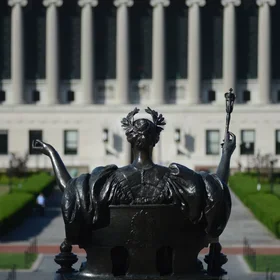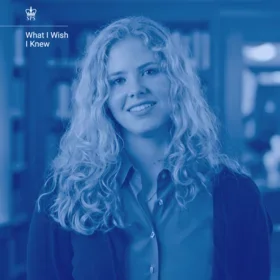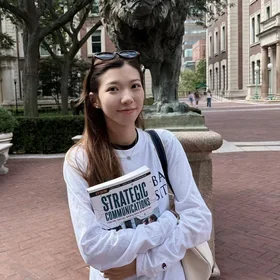Jyoti Ponnapalli, ’22SPS, Executive Technology Management, is the Director of Blockchain/DLT Security at the Depository Trust & Clearing Corporation. Based in Dallas, she is pursuing her degree online, and looks forward to traveling to New York City for her upcoming residency. Ponnapalli discusses what led her to found Bloqchain Solutions, her passion for digital transformation in the financial industry, and her experience in the program thus far.
Tell us about your career, from your work as a Microsoft architect to today.
I graduated from University of Mumbai, and in 2003, I had the opportunity to come to the United States. I provided consulting services for digital collaboration, and I helped Fortune 500 companies build their corporate collaboration portals from the ground up. The concept of corporate collaboration was new at the time. The experience taught me what the internet can do for organizations internally, in terms of collaboration. Over the next fifteen years, I was identifying barriers that teams faced, and was very interested in seeking out solutions and resolutions to these barriers.
About five years ago I learned about the concept of blockchain, the underlying technology for Bitcoin. It was also a technology that could provide for cross-corporate collaboration--this was my “bingo” moment. I was thinking about how I might implement blockchain to fix pain points while building these cross-corporate systems, and modernize these portals to levels that were not previously available. This led me to found Bloqchain Solutions, which is my second startup.
I have been a small business owner for more than a decade now, and have done some consulting as well. Consulting gave me flexibility and the choice of companies that I wanted to work with. So I found myself thriving in my career with consulting work when I decided to pivot my company to develop blockchain solutions. My work has spanned various industries and projects, from the digital transformation of supply chain in retail, to building out track and trace systems for food provenance.
Why did you seek out the Executive M.S. in Technology Management? Why did you choose Columbia, specifically?
Before COVID hit, I was given an opportunity to have a seat at the leadership table, but I felt I lacked the confidence required of leadership to communicate effectively. I was beginning to notice some skills gaps in myself and knew a graduate program would help take me to the next level. I thought through what type of program would be best for me. I had already been working for twenty years, I was already a technologist in and out. I did not want to pull myself out of the tech arena, which is my passion. I wanted a program that combines corporate strategy, management skills, and digital transformation, and a program that would teach me to apply these concepts in the technology sector.
I kept coming back to Columbia’s Executive M.S. in Technology Management program because it was the perfect combination of the technology and management skills I knew would allow me to move into the next stage of my career.
Describe your role at the Depository Trust & Clearing Corporation. What led to your new position as Director of Blockchain/DLT Security Strategy?
I was consulting for DTCC in an advisory capacity for the past couple of years. This year, they offered me to come onboard full-time. I had been wanting to move into corporate strategy and have the opportunity to implement emerging technologies that are likely to be the future.
The future of the industry will be a digital platform. In the next twenty years, we are going to see significant modernization of all industries, specifically in finance, with respect to payments, cryptocurrencies, central banking technologies, and digital assets and tokenizations. Anything you touch, every asset, is going to be tokenized in the future. I am passionate about the idea that the entire concept and future of money is shifting to a digital format. There will be a seismic shift towards digital transformation of the financial services industry. This position will allow me to work to enable projects with these trends and capabilities in mind.
Are you able to apply what you are learning in your day-to-day work? Are there any courses, faculty members, or parts of the program that have stuck out to you as being particularly impactful?
Every single course I took in my first term, my second term… I have been applying what I have been learning every step of the way. I loved Art Langer’s class Digital Transformation class. He taught us that the future of every industry is going to be technology-first. Norman Jacknis and Mark Mooney’s executive seminars were fantastic.
Lyle York’s Strategic Advocacy class was personally very developmental for me. I am now able to gauge a 360-degree view of key concepts, and I can now understand key value propositions that I need to factor in when I make a case. This was so helpful because it opened the doors to be able to understand and approach leadership, to connect strategy with the services of my team.
How are you finding the mentorship and capstone experience?
The mentorship program starts in the first semester and goes through the end of the third semester. It has been an honor working with my mentor, Virginia Gambale. She has been working with the program for fifteen years and has been a great inspiration. She helped me think through product viability--how I can move from concept to reality.
The mentorship program is not solely to help your professional journey or provide an academic journey. My mentor is supporting my holistic personal development. We converse about many things beyond my project. She advises me on my career and work-life balance, and she even takes me along to women leadership seminars. She is the best part of the program for me. She once told me "You have me for life!" It means a lot to me that the relationships I am building here will become my network for life. To me, that goes a long way.
Throughout my career, I have always been more services-driven. I never knew the product side, it just wasn’t in my portfolio. My capstone project forced me to think of the creative, product side. I wanted my project to combine a social cause with an emerging technology and advance the financial landscape.
My capstone introduces a decentralized microfinance platform that benefits the marginalized. The product utilizes blockchain to help mitigate the pain points of building such a platform. I was inspired by Muhammad Yunus, who won the Nobel Peace Prize for his work in microcredit and microfinance, giving microloans to marginalized populations who are unbanked. Especially before COVID, microfinance has always been a cumbersome process. Many of these rural areas rely on old processes, such as having agents visit people where they live.
I have been presenting and iterating my decentralized microfinance project each semester, and in September, I will present the final project.
What are you most excited about in the industry? What impact are you hoping to make once completing the program?
I find myself extremely fortunate to be working in the finance industry in this current moment. It is a fascinating world—the future of money, the future of technology—that drives how all businesses operate and function. The solutions we are working on now will determine how future businesses will be built and how money will be designed, and I am so grateful and excited to find myself in the midst of that transformation.


